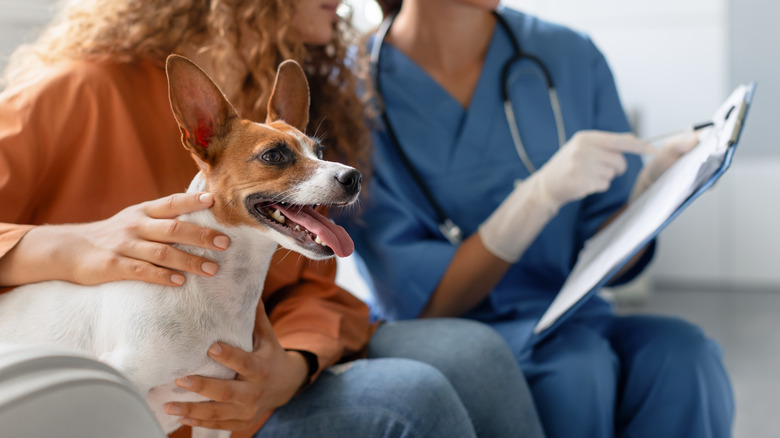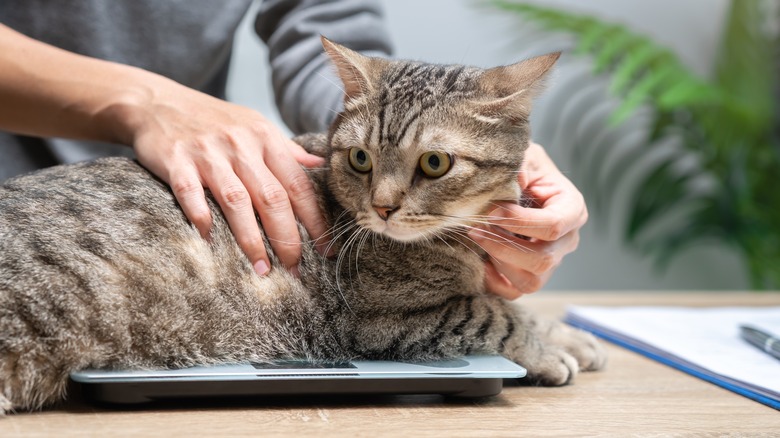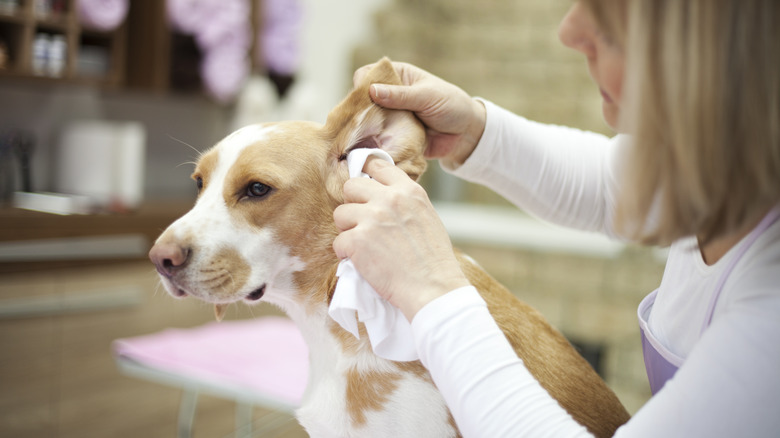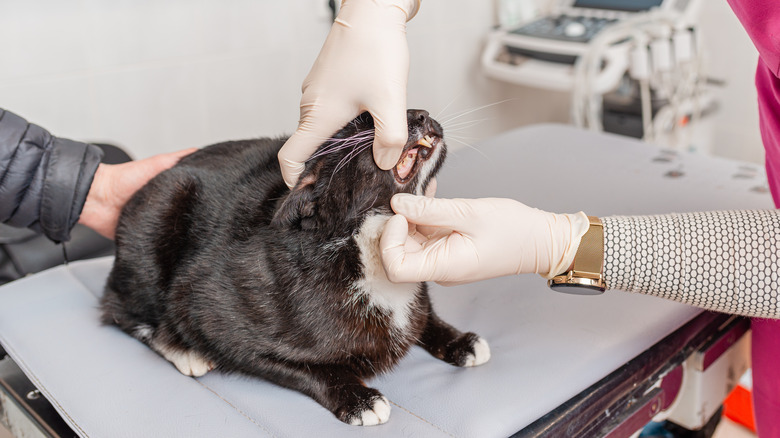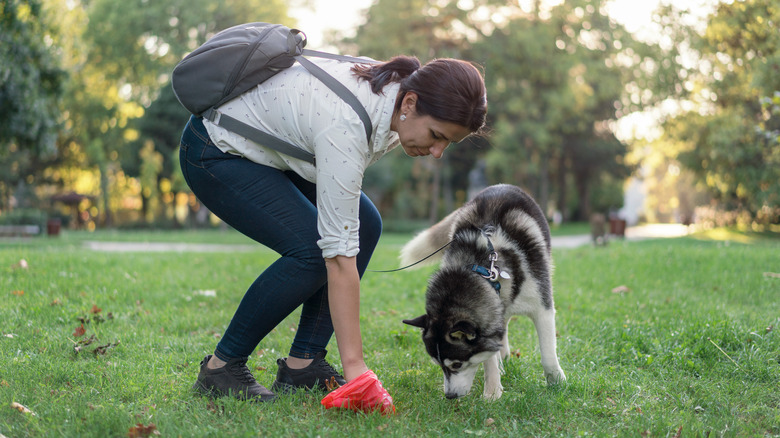14 Questions You Should Always Ask During A Vet Appointment
Vet appointments can be a stressful event, especially if your pet gets anxious in unfamiliar environments. To make the most out of these appointments, it's important to come prepared with questions you want to ask your vet. During all the commotion, conversation, and whining from pets around you, it's easy to forget what you wanted to ask them. Asking specific questions about your pet's weight, lifestyle, diet, and health will provide you with insight into your pet's well-being and help you make important and well-informed decisions about their treatment and care.
Having open discussions about your pet's health and not skipping annual check-ups will also strengthen your relationship with your vet and build your trust in their advice. This will be especially necessary when your pet ages and potentially develops more health issues. Being comfortable enough to ask questions about their diagnosis and discuss available treatment options in detail will give your pet the best chance of getting through difficult times.
1. Do I need to make any changes to my pet's diet?
What you feed your pet may need to change depending on their life stage, health issues, and food quality. Young, developing pets, adults, and seniors need to be on different diets that are appropriate for their life stages. Age-appropriate diets provide pets with their dietary needs, which change as they age. Because different breeds are considered adults or seniors at different ages, it's important to chat with your vet about when to change their food.
Your vet may also recommend a diet change or a food trial if your pet has certain health issues. There are special diets that can ease symptoms for pets with food allergies, heart disease, anal gland disease, urinary disease, cancer, arthritis, obesity, and many others. Although these diets won't cure your pet, they contain specific calories and nutrients formulated to keep your pet comfortable and fuel their bodies.
Your vet may also recommend a different diet if they notice that your pet is lacking nutritionally. Low-quality pet food is often more affordable but loaded with fillers that don't benefit your pet, as well as contain too few vitamins, minerals, animal protein, and fat. Pets on poor diets often have dull, brittle coats, changes in coat color, and dry and damaged skin.
2. Is my pet's weight healthy?
It's normal for your pet's weight to change. Changes to their diet, exercise frequency, age, spaying or neutering, and medical problems can all contribute to these changes. However, big weight changes are concerning. Pet owners often don't notice weight changes because they're constantly with their pets, so it's important for pets to be weighed at every vet appointment. Your vet will record every weigh-in of your pet and compare your pet's current weight to previous records to see how much they have gained or lost since their last appointment.
Be open and receptive to what your veterinarian says about your pet's weight so that you can make the necessary changes they recommend. Pets that aren't at a healthy weight are at a higher risk of health problems and injury. Your vet may want to take extra tests to determine if the weight gain or loss is due to medical issues. If your pet is healthy, they'll work with you to come up with a weight management plan and how much to feed your dog based on their weight. It may include lowering their caloric intake and increasing their activity level.
3. Should I adjust my pet's appointment schedule?
Depending on the health and age of your pet, your veterinarian will recommend a new appointment schedule. Pets under the age of one will need to go for regular appointments to complete their primary vaccinations and get spayed or neutered. From 6 to 8 weeks of age, young pets will need to go to the vet for their vaccinations about three different times within the next 10 weeks. Another big appointment for pets under the age of one is getting spayed or neutered. For kittens, this will happen from four months of age. For smaller breed puppies, this can happen at six months, though a larger or giant breed can wait until around 12-18 months old. Although it is safer to do it earlier, you can also spay or neuter an older dog or cat as long as they are healthy.
Adult pets typically only need a wellness check once a year. Vets want to see adult dogs annually to catch health problems early – preferably before you can start seeing symptoms. They also need to give them their annual booster shots and other preventative treatments. If your vet has any concerns about their health, mental state, or behavior, they may ask to see them more regularly.
Senior pets should go every six months because they're at a higher risk for illness and injury due to their age. Pets with illnesses must also be seen regularly for monitoring and treatment. How often your vet will want to see your pet will depend on your pet's health, so chat with your veterinarian about what your new schedule will look like.
4. Is my pet getting enough exercise?
How many minutes or hours of exercise your pet needs depends on their breed, health, and life stage. By looking at these different factors, your vet will give you an idea of how much exercise your individual pet needs. However, they may suggest that your pet needs more exercise if they're becoming destructive, gaining weight, or displaying personality changes.
It can be tough to increase your pet's exercise, especially if you've got your hands full or work long hours. But a lack of exercise can severely affect your pet's health and well-being. If you're unable to provide your pet with the exercise they need, hire a walker or a pet sitter who can play with and exercise your pet while you're at work.
Remember, exercise includes a variety of activities. For cats, it can be walking them on a leash or waving a feather toy or laser around for them to jump and chase after. Although important, walking or running isn't the only way to release your dog's energy. You can take them along for a swim or hike or play games with them, such as fetch, tug-of-war, and hide-and-seek. Take your pet's age into consideration. How much exercise a puppy needs will be completely different from how much an adult dog requires. Young and senior pets need shorter exercise sessions than adult pets and less intense activities to protect their joints.
5. Do you recommend any extra tests or screenings?
Depending on your pet's breed, current health problems, or signs of potential health problems, your veterinarian may advise on a few extra tests or screenings every now and then. These tests are necessary to catch problems early or to rule out any concerns your veterinarian may have. The tests might also be necessary to see disease progression so that your veterinarian can adjust your pet's care or treatment.
At every vet appointment, your vet will test for heartworm and other internal parasites. Fecal and urine tests are common because they give your vet a lot of information about your pet's health. To check your pet's organs and internal health, they'll do a blood test. These tests are relatively normal. However, sometimes, they'll recommend extra tests such as X-rays, MRIs, CT scans, allergy testing, and a few minimally invasive procedures, along with others. Ask your vet why they think these tests and screenings are necessary and what types of health issues they're investigating.
6. Can I make improvements to my pet's at-home care routine?
Taking your pet to their wellness appointments is important, but there's also a lot to do at home between checkups. Grooming your pet is a lot more than just brushing their coat. It also includes brushing their teeth, cleaning their eyes and ears, trimming their nails, and occasional baths. Proper grooming reduces fleas and ticks, matted, painful coats, prevents joint pain from overgrown nails, helps discover rashes or lumps early, and keeps their coat and skin healthy and hydrated.
There are always improvements to be made to your pet's at-home care routine. After your veterinarian has examined your pet, they may advise that you clean your pet's ears or eyes more frequently or differently from how you have been doing it. As your pet ages, they may struggle to groom themselves properly due to pain or stiffness. Obese pets also struggle to reach all the areas of their body. Your vet will advise you on ways to increase or improve your care. If you're unsure how to trim overgrown dog nails, for example, take this opportunity to ask your vet to show you how to do it properly and safely.f
7. Is my pet experiencing any oral health problems?
The goal of brushing your pet's teeth isn't just to keep their breath smelling fresh but also to prevent health issues. Like humans, plaque builds up on pets' teeth, and if it isn't dealt with properly, it can lead to gum disease and infection. This can make life very difficult for your pet because eating will be very painful.
However, brushing your pet's teeth isn't enough to keep their oral health good. They also need professional dental cleanings every year or two, especially if their breed is known to suffer from dental disease. Instead of seeing professional teeth cleaning as a separate procedure, view it the same way you do any other type of routine preventative treatment. It's necessary to prevent issues and fix any problems that do arise early.
Other than bad breath, signs of poor oral health are difficult to spot. They can also worsen over time, even with tooth brushing, so it's important to regularly ask your vet questions about your pet's oral health and how to remove tartar from their teeth effectively. Depending on what your vet sees when examining your pet's mouth, they'll recommend how often they'd like your pet's teeth to be professionally cleaned. To reduce plaque buildup, your veterinarian may also suggest certain chew toys and dental treats for your pet.
8. Does my pet currently need any flea/tick treatments?
Your veterinarian may suggest flea/tick treatment depending on whether your pet currently has external parasites, if they're indoor pets, the current season, and your geographic location. Fleas are more active in warm and humid temperatures and are, therefore, more of a problem for pets during these times. The problem with fleas is that they can irritate your pet's skin and cause discomfort. Your pet can also be allergic to their saliva and develop wounds from excessive scratching that can turn into infections. Ticks and fleas can also transmit diseases to your pet, such as Lyme disease. Pets also commonly get tapeworms by ingesting fleas that are carriers of tapeworm larvae.
If your vet thinks your pet is at risk of getting fleas and ticks, they'll recommend various flea/tick treatments. Medicated shampoos, powders, sprays, and collars are a few options. Topical and oral options are also available. Discuss each option with your vet, as some types aren't recommended for young pets or are safe to use around children.
9. Should my pet get non-core vaccines?
Unlike core vaccines, which are required for cats and dogs, non-core vaccines are optional because not all pets need them. However, just because these aren't core vaccines doesn't mean they're not important, as they can be the difference between your pet becoming incredibly ill or not. Discussing whether your pet needs certain non-core vaccines with your vet is important because they'll understand the risk involved based on your pet's lifestyle and health. Factors your vet will consider are whether there are certain disease outbreaks in your area, if your cat or dog is an indoor pet, if they socialize with other pets, and if they're likely to drink or swim in lakes and rivers.
According to Veterinary Practice News, it's important not to disregard certain non-core vaccines because they're "optional" and costly. For high-risk pets, these vaccines should be considered "core." For example, an indoor dog from the U.K. won't need the Lepto vaccine as much as an outdoor dog who lives in Puerto Rico because Leptospirosis is commonly found in water and outdoor areas in tropical climates.
10. Is my pet showing signs of health issues that the breed is prone to?
People often pick certain breeds based on their energy levels, features, and behaviors but often overlook the topic of health. Many breeds are at risk for certain health issues. For example, breeds with flat faces tend to have breathing problems, which makes exercising and even eating difficult. Due to their many wrinkles, they also tend to have skin issues. According to Forbes, the popular boxer breed is one of the top breeds that most commonly develop cancer, with beagles and golden retrievers also having a high risk.
With this in mind, it's important to have your pet checked for early signs of health issues their breed is prone to, which your vet will do at every appointment. As much as it's difficult to come to terms with the potential health problems your pet may face, knowing what to expect will help you plan ahead and deal with problems early. If your vet does pick up on early signs of health problems, they'll come up with a treatment/management plan for your pet. This early intervention will make your pet's prognosis much better than if issues were detected in an advanced stage.
11. Can you see signs of aging in my pet, and what should I look out for?
Like weight changes in your pet, it's just as difficult for pet owners to spot early signs of aging in their pets because the changes are so gradual. However, your veterinarian will know what to look out for mentally and physically. This probably won't be something you think about much when your pet is still young. However, because vet visits are usually only necessary once a year during their adult years, conversations about aging can spring up on you sooner than you may expect.
Start asking your vet questions about signs of aging before they reach their senior years. This will help you spot them early and be prepared for them. As pets age, they often experience joint pain and may need orthopedic beds, raised bowls, ramps, and access to all they need on one level of your home so they don't have to use the stairs. If their hearing or vision starts to decline, make the necessary adjustments to your home quickly so that your pet knows their way around comfortably before they lose those senses entirely.
Cognitive decline often accompanies old age. It could cause your pet to become more fearful and aggressive, become restless at night, sleep for longer periods, bark or meow a lot more than usual, forget their training and house rules, become confused, and seem lost in their own home. To slow your pet's mental decline, continue exercise and provide mental stimulation through puzzle games and playtime.
12. Do you have any updates on pet healthcare trends?
We're often so focused on the latest technological, fashion, or business trends that we forget there are new trends in the pet healthcare industry, too. They impact pet owners and their pets, and staying on top of them will keep you informed. There is plenty of information out there for you to research on your own, but your vet is a great source for updates on healthcare trends because they directly impact their industry.
According to Forbes, pets that aren't insured may no longer be accepted by clinic networks in the near future, which will affect many pet owners. Knowing information like this is essential so that you can do something about it before changes are implemented. There is also talk of the use of AI tools in the veterinary industry, which is exciting news because these tools will help vets detect signs of health issues in pets earlier than ever before.
13. Are there improvements I can make to support my pet's emotional well-being?
Just like people, pets can also struggle with anxiety, depression, and stress. According to Guide Dogs, 74% of U.K. dogs have signs of these struggles. For sensitive pets who are triggered by minor changes, these mental struggles can form part of their day-to-day life. Sometimes, these signs are easy to spot through behavior changes and a lack of appetite. But, often, signs of mental illness in dogs and cats go unnoticed, with many owners not even being aware that pets can struggle with mental health.
If your veterinarian identifies signs of poor mental health in your pet, you'll need to make a few changes to support your pet. However, even with your support, your pet will likely still have ups and downs. Ways to support your pet's mental health are through spending time with them through exercise and play, keeping them mentally stimulated with new toys, games, and puzzles, taking them to the beach or park, exposing them to fresh air and sunshine, and even playing soothing sounds for them to listen to.
14. What do I need to bring for the next appointment?
Instead of guessing what to bring to your next appointment, ask your vet. Some appointments require different things, especially as your concerns or questions change. For example, if you have questions about your pet's treats, bring them along to your appointment. If you've noticed a strange, new behavior, bring a video recording to show your vet.
Often, your veterinarian will want to test your pet's feces and/or urine. However, they can't wait all day for your pet to eliminate. If they ask you to bring a fresh sample to your pet's next appointment, ask them to walk you through how to collect it effectively. They may also need to see all the medication your pet is taking, so bring that along, too.
